新版外研社七年级英语三种时态复习要点及巩固练习.doc
新版外研社七年级英语三种时态复习要点及巩固练习
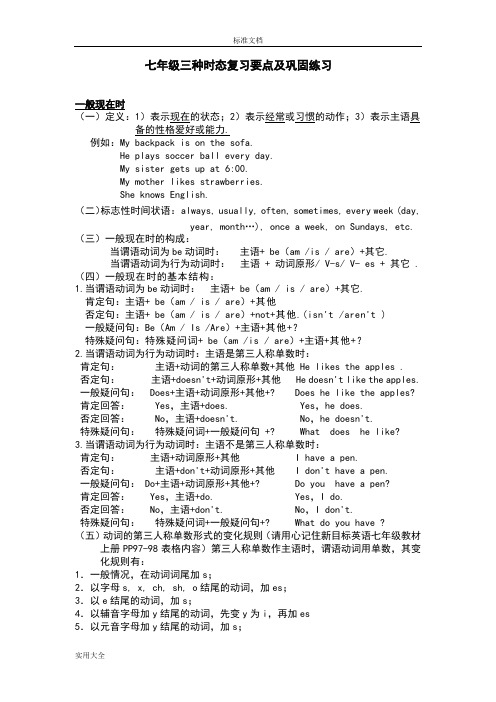
七年级三种时态复习要点及巩固练习一般现在时(一)定义:1)表示现在的状态;2)表示经常或习惯的动作;3)表示主语具备的性格爱好或能力.例如:My backpack is on the sofa.He plays soccer ball every day.My sister gets up at 6:00.My mother likes strawberries.She knows English.(二)标志性时间状语: always, usually, often, sometimes, every week (day,year, month…), once a week, on Sundays, etc. (三)一般现在时的构成:当谓语动词为be动词时:主语+ be(am /is / are)+其它.当谓语动词为行为动词时:主语 + 动词原形/ V-s/ V- es + 其它 . (四)一般现在时的基本结构:1.当谓语动词为be动词时:主语+ be(am / is / are)+其它.肯定句:主语+ be(am / is / are)+其他否定句:主语+ be(am / is / are)+not+其他.(isn't /aren't )一般疑问句:Be(Am / Is /Are)+主语+其他+?特殊疑问句:特殊疑问词+ be(am /is / are)+主语+其他+?2.当谓语动词为行为动词时:主语是第三人称单数时:肯定句:主语+动词的第三人称单数+其他 He likes the apples .否定句:主语+doesn't+动词原形+其他 He doesn't like the apples. 一般疑问句: Does+主语+动词原形+其他+? Does he like the apples? 肯定回答: Yes,主语+does. Yes,he does.否定回答: No,主语+doesn't. No,he doesn't.特殊疑问句:特殊疑问词+一般疑问句 +? What does he like?3.当谓语动词为行为动词时:主语不是第三人称单数时:肯定句:主语+动词原形+其他 I have a pen.否定句:主语+don't+动词原形+其他 I don't have a pen.一般疑问句: Do+主语+动词原形+其他+? Do you have a pen?肯定回答: Yes,主语+do. Yes,I do.否定回答: No,主语+don't. No,I don't.特殊疑问句:特殊疑问词+一般疑问句+? What do you have ?(五)动词的第三人称单数形式的变化规则(请用心记住新目标英语七年级教材上册PP97-98表格内容)第三人称单数作主语时,谓语动词用单数,其变化规则有:1.一般情况,在动词词尾加s;2.以字母s, x, ch, sh, o结尾的动词,加es;3.以e结尾的动词,加s;4.以辅音字母加y结尾的动词,先变y为i,再加es5.以元音字母加y结尾的动词,加s;6.特殊:have→has are→is现在进行时(一)定义:表示现在(说话瞬间)正在进行或发生的动作,也可表示当前一段时间内的活动或现阶段正在进行(二)标志性时间状语:now, listen! look! at this time, these days, etc. (三)构成: 主语+助动词be( am/ is / are / ) +动词-ing(现在分词)形式+其它。
外研新标准七年级英语下册复习提纲

外研新标准七年级英语下复习提纲语法(一)动词的时态 四种:一般现在时、现在进行时、一般过去时和一般将来时。
1.一般现在时1)构成:谓语的行为动词用原形或第三人称单数,现阶段经常性,习惯性的动作或状态客观真理 例如:The earth goes around the sun.4)标志词:often usually sometimes always every day never , in the morning 等。
( )1.The 70-year-old man often ______ sports in the morning.A. doesB. are doingC.didD. will do2. 现在进行时 1)现在进行时的构成:谓语为am/is/ are+ v-ing正在进行或发生的动作例如:She is having a bath now .位移动词可用现在进行时表将来(仅限于go, come, leave, , fly , 等动词)。
如: We are flying to Beijing.4) 标志词: at the moment,now ,Listen,Look 等。
( )3.--- Be quick.They for usA. are waitingB.waitC.waitingD.waited3.一般将来时1)一般将来时的构成:谓语为1. 助动词will(shall)+动词原形1.将要发生的动作。
例如:I will leav e for Beijing tomorrow.2.将要存在的状态。
例如:This time next year I will be in Japan.3.打算要做的事。
例如:Are you going to watch the film on television tonight?3) 标志词:tomorrow next week in 2020 等。
()1. I___ for Hong Kong on Saturday. Will you go to see me off at the airport?A. am leavingB. am leftC. am going to leavingD. left()2. They ______ have a football match in August 2012.A.hadB. will havingC. are havingD. are going to have4.一般过去时1)一般过去时的构成:谓语为动词的过去式:4). 时间标志词:yesterday,three years ago,last year,in 1979,等。
(word完整版)外研版七年级下册英语语法专题复习(含练习)(2)

下册重要知识点梳理词类形容词性物主代词和名词性物主代词的关系:形容词性物主代词:必须和名词在一起。
My father, vour teacher... 物主代词Y-名词性物主代词:相当于与之相对应的形容词性物主代词+名词。
This shirt is mine. =This is my shirt.练习(1 )选择题。
( ) 1. Look at .A . him B.heC. his( ) 2. I drive to the park everydayA . they B. .their C. them( ) 3. clissroom is big.A . we B. us C. Our( ) 4. I loveA. sheB. herC. hers( )5. Do you know ?A. IB. myC. me( )6. I am son.A. theyB. theirC. them( )7. This is not desk.. My desk is over there.A. IB. myC. me( ) 8. —Can you spell n ame, Harry? —Sorry.A. youB.your <C. yours( )9. Tom and Jack are brothers. This is room.A. theyB. themC. their( )10. We are in the same class. classroom is very niceA. ourB. myC. ours( ) 11. Mrs. Green is my teacher. I ' m stude nt.A. heB. hisC. him( ) 12. That ' s a cat. n ame is Mimi.A. ItB. It 'sC. Its(2 ) 用括号里的代词的适当形式填空1, Mr Yang is ______ (we) teacher. _______ (him) is from Beiji ng. ______ (his) teaches _____ (our) En glish.2, Look,there is a cat. ______ (they) is Lily's. __ (it) n ame is Mimi.3, Let ____ (I) tell _____ (she) about _____ (he) life at school.4, This is _____ (they) room.Where is _____ (our)?5, Don't use the eraser. ____ is ______ (me).6, The lady un der the tree is _____ (me) aunt. ____ (her) ofte n sings with____ (she) husba nd2) 情态动词can1. 含义:表达人或物的能力,能或会…2. 特点:情态动词can没有人称和数的变化,之后要加动词原形。
新版外研社七年级英语三种时态复习要点及
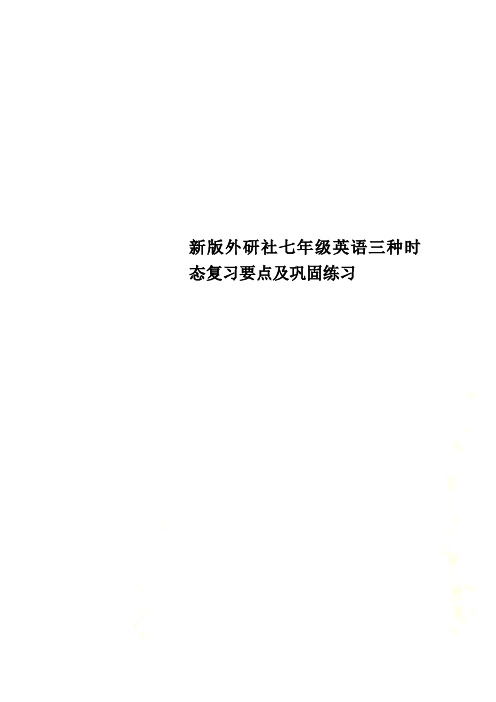
新版外研社七年级英语三种时态复习要点及巩固练习七年级三种时态复习要点及巩固练习一般现在时(一)定义:1)表示现在的状态;2)表示经常或习惯的动作;3)表示主语具备的性格爱好或能力.例如:My backpack is on the sofa.He plays soccer ball every day.My sister gets up at 6:00.My mother likes strawberries.She knows English.(二)标志性时间状语:always, usually, often, sometimes, every week (day, year,month…), once a week, on Sundays, etc.(三)一般现在时的构成:当谓语动词为be动词时:主语+ be(am /is / are)+其它.当谓语动词为行为动词时:主语+ 动词原形/ V-s/ V- es + 其它. (四)一般现在时的基本结构:1.当谓语动词为be动词时:主语+ be(am / is / are)+其它.肯定句:主语+ be(am / is / are)+其他否定句:主语+ be(am / is / are)+not+其他.(isn't /aren't )一般疑问句:Be(Am / Is /Are)+主语+其他+?特殊疑问句:特殊疑问词+ be(am /is / are)+主语+其他+?2.当谓语动词为行为动词时:主语是第三人称单数时:肯定句:主语+动词的第三人称单数+其他 He likes the apples . 否定句:主语+doesn't+动词原形+其他 He doesn't like theapples.一般疑问句: Does+主语+动词原形+其他+? Does he like the apples? 肯定回答: Yes,主语+does. Yes,he does.否定回答: No,主语+doesn't. No,he doesn't.特殊疑问句:特殊疑问词+一般疑问句 +? What does he like? 3.当谓语动词为行为动词时:主语不是第三人称单数时:肯定句:主语+动词原形+其他 I have a pen.否定句:主语+don't+动词原形+其他 I don't have a pen.一般疑问句: Do+主语+动词原形+其他+? Do you have a pen?肯定回答: Yes,主语+do. Yes,I do.否定回答: No,主语+don't. No,I don't.特殊疑问句:特殊疑问词+一般疑问句+? What do you have ? (五)动词的第三人称单数形式的变化规则(请用心记住新目标英语七年级教材上册PP97-98表格内容)第三人称单数作主语时,谓语动词用单数,其变化规则有:1.一般情况,在动词词尾加s;2.以字母s, x, ch, sh, o结尾的动词,加es;3.以e结尾的动词,加s;4.以辅音字母加y结尾的动词,先变y为i,再加es5.以元音字母加y结尾的动词,加s;6.特殊:have→has are→is现在进行时(一)定义:表示现在(说话瞬间)正在进行或发生的动作,也可表示当前一段时间内的活动或现阶段正在进行(二)标志性时间状语:now, listen! look! at this time, these days, etc.(三)构成: 主语+助动词be( am/ is / are / ) +动词-ing(现在分词)形式+其它。
外研版初一英语时态专题复习
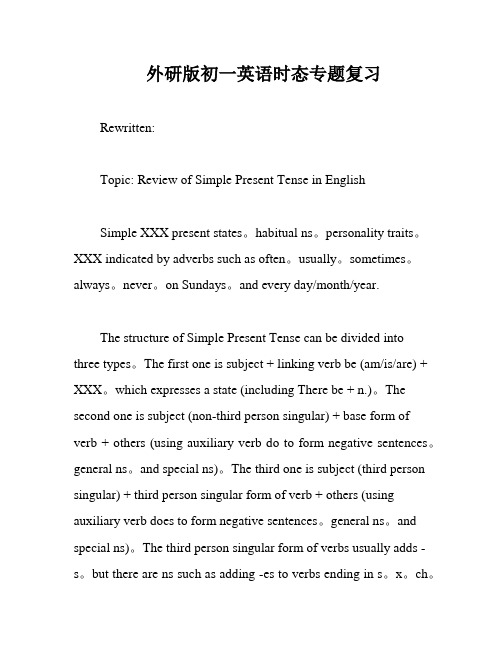
外研版初一英语时态专题复习Rewritten:Topic: Review of Simple Present Tense in EnglishSimple XXX present states。
habitual ns。
personality traits。
XXX indicated by adverbs such as often。
usually。
sometimes。
always。
never。
on Sundays。
and every day/month/year.The structure of Simple Present Tense can be divided into three types。
The first one is subject + linking verb be (am/is/are) + XXX。
which expresses a state (including There be + n.)。
The second one is subject (non-third person singular) + base form of verb + others (using auxiliary verb do to form negative sentences。
general ns。
and special ns)。
The third one is subject (third person singular) + third person singular form of verb + others (using auxiliary verb does to form negative sentences。
general ns。
and special ns)。
The third person singular form of verbs usually adds -s。
but there are ns such as adding -es to verbs ending in s。
外研社七年级英语三种时态复习要点及巩固练习
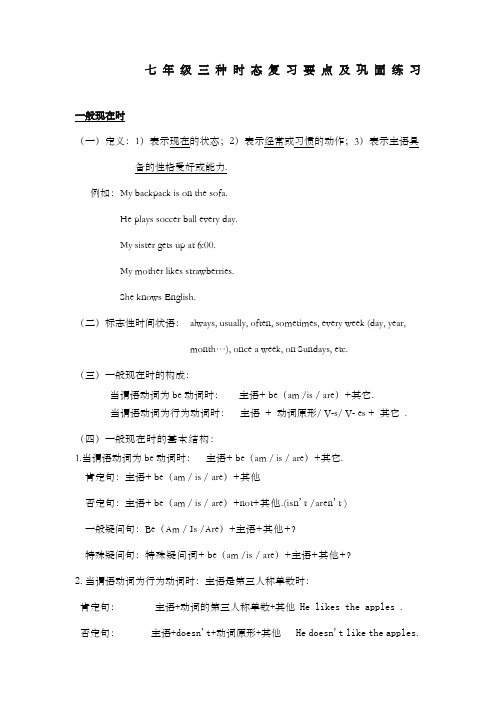
七年级三种时态复习要点及巩固练习一般现在时(一)定义:1)表示现在的状态;2)表示经常或习惯的动作;3)表示主语具备的性格爱好或能力.例如:My backpack is on the sofa.He plays soccer ball every day.My sister gets up at 6:00.My mother likes strawberries.She knows English.(二)标志性时间状语:always, usually, often, sometimes, every week (day, year,month…), once a week, on Sundays, etc.(三)一般现在时的构成:当谓语动词为be动词时:主语+ be(am /is / are)+其它.当谓语动词为行为动词时:主语+ 动词原形/ V-s/ V- es + 其它. (四)一般现在时的基本结构:1.当谓语动词为be动词时:主语+ be(am / is / are)+其它.肯定句:主语+ be(am / is / are)+其他否定句:主语+ be(am / is / are)+not+其他.(isn't /aren't )一般疑问句:Be(Am / Is /Are)+主语+其他+?特殊疑问句:特殊疑问词+ be(am /is / are)+主语+其他+?2.当谓语动词为行为动词时:主语是第三人称单数时:肯定句:主语+动词的第三人称单数+其他 He likes the apples .否定句:主语+doesn't+动词原形+其他 He doesn't like the apples.一般疑问句: Does+主语+动词原形+其他+? Does he like the apples?肯定回答: Yes,主语+does. Yes,he does.否定回答: No,主语+doesn't. No,he doesn't.特殊疑问句:特殊疑问词+一般疑问句 +? What does he like?3.当谓语动词为行为动词时:主语不是第三人称单数时:肯定句:主语+动词原形+其他 I have a pen.否定句:主语+don't+动词原形+其他 I don't have a pen.一般疑问句: Do+主语+动词原形+其他+? Do you have a pen?肯定回答: Yes,主语+do. Yes,I do.否定回答: No,主语+don't. No,I don't.特殊疑问句:特殊疑问词+一般疑问句+? What do you have ?(五)动词的第三人称单数形式的变化规则(请用心记住新目标英语七年级教材上册PP97-98表格内容)第三人称单数作主语时,谓语动词用单数,其变化规则有:1.一般情况,在动词词尾加s;2.以字母s, x, ch, sh, o结尾的动词,加es;3.以e结尾的动词,加s;4.以辅音字母加y结尾的动词,先变y为i,再加es5.以元音字母加y结尾的动词,加s;6.特殊:have→has are→is现在进行时(一)定义:表示现在(说话瞬间)正在进行或发生的动作,也可表示当前一段时间内的活动或现阶段正在进行(二)标志性时间状语:now, listen! look! at this time, these days, etc.(三)构成: 主语+助动词be( am/ is / are / ) +动词-ing(现在分词)形式+其它。
新版外研社七年级英语三种时态复习要点及巩固练习

标准文档七年级三种时态复习要点及巩固练习一般现在时)表示主语具32)表示经常或习惯的动作;(一)定义:1)表示现在的状态;.备的性格爱好或能力例如:My backpack is on thesofa.He plays soccer ball every day.My sister gets up at 6:00.My mother likes strawberries.She knows English.(二)标志性时间状语:always, usually, often, sometimes, every week (day, year, month…), once a week, on Sundays, etc.(三)一般现在时的构成:当谓语动词为be动词时:主语+ be(am /is / are)+其它.当谓语动词为行为动词时:主语+ 动词原形/ V-s/ V- es + 其它.(四)一般现在时的基本结构:1.当谓语动词为be动词时:主语+ be(am / is / are)+其它.肯定句:主语+ be(am / is / are)+其他否定句:主语+ be(am / is / are)+not+其他.(isn't /aren't )一般疑问句:Be(Am / Is /Are)+主语+其他+?特殊疑问句:特殊疑问词+ be(am /is / are)+主语+其他+?2.当谓语动词为行为动词时:主语是第三人称单数时:肯定句:主语+动词的第三人称单数+其他 He likes the apples .否定句:主语+doesn't+动词原形+其他 He doesn't like the apples. 一般疑问句: Does+主语+动词原形+其他+? Does he like the apples?肯定回答: Yes,主语+does. Yes,he does.否定回答: No,主语+doesn't. No,he doesn't.特殊疑问句:特殊疑问词+一般疑问句 +? What does he like?3.当谓语动词为行为动词时:主语不是第三人称单数时:肯定句:主语+动词原形+其他 I have a pen.否定句:主语+don't+动词原形+其他 I don't have a pen.一般疑问句: Do+主语+动词原形+其他+? Do you have a pen?肯定回答: Yes,主语+do. Yes,I do.否定回答: No,主语+don't. No,I don't.特殊疑问句:特殊疑问词+一般疑问句+? What do you have ?(五)动词的第三人称单数形式的变化规则(请用心记住新目标英语七年级教材上册PP97-98表格内容)第三人称单数作主语时,谓语动词用单数,其变化规则有:1.一般情况,在动词词尾加s;2.以字母s, x, ch, sh, o结尾的动词,加es;3.以e结尾的动词,加s;4.以辅音字母加y结尾的动词,先变y为i,再加es5.以元音字母加y结尾的动词,加s;实用大全.标准文档6.特殊:have?has are?is现在进行时(一)定义:表示现在(说话瞬间)正在进行或发生的动作,也可表示当前一段时间内的活动或现阶段正在进行(二)标志性时间状语:now, listen! look! at this time, these days, etc.(三)构成: 主语+助动词be( am/ is / are / ) +动词-ing(现在分词)形式+其它。
完整)外研版七年级下册英语语法专题复习(含练习)

完整)外研版七年级下册英语语法专题复习(含练习)YOUWIN n的初中英语内部资料为外研版七年级下册的重点知识点梳理。
以下是该资料中的语法知识点。
1.词类:物主代词、情态动词can和方位介词短语。
2.时态:一般将来时态和一般过去时态。
3.句型:特殊疑问句、祈使句、感叹句和选择疑问句。
在物主代词方面,单数包括第一人称、第二人称和第三人称。
形容词性物主代词必须和名词在一起,如my father、your teacher。
名词性物主代词相当于与之相对应的形容词性物主代词和名词的组合,如this shirt is mine,相当于this is my shirt。
在复数方面,形容性物主代词包括our、your和their,名词性物主代词包括ours、yours和theirs。
而词类方面,包括mine、yours、his、hers和its,形容词性物主代词包括my、your、his、her和its。
练题包括选择题和填空题,以检验学生对物主代词的掌握程度。
11.Mrs。
Green is my teacher。
I am her student.12.That's a cat。
Its name is Mimi.1.Mr。
Yang is our teacher。
He is from Beijing。
He teaches us English.2.Look。
there is a cat。
It is Lily's。
Its name is Mimi.3.Let me tell her about my life at school.4.This is their room。
Where is ours?5.Don't use the eraser。
It is mine.6.The lady under the tree is my aunt。
She often sings with her husband.Can is a modal verb that expresses ability or possibility。
完整word版外研版初一英语时态专题复习
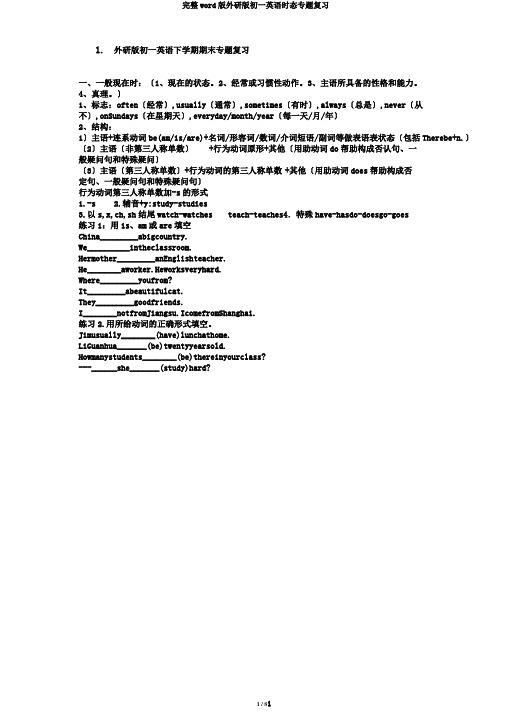
1.外研版初一英语下学期期末专题复习一、一般现在时:〔1、现在的状态。
2、经常或习惯性动作。
3、主语所具备的性格和能力。
4、真理。
〕1、标志:often〔经常〕,usually〔通常〕,sometimes〔有时〕,always〔总是〕,never〔从不〕,onSundays〔在星期天〕,everyday/month/year〔每一天/月/年〕2、结构:1〕主语+连系动词be(am/is/are)+名词/形容词/数词/介词短语/副词等做表语表状态〔包括Therebe+n.〕〔2〕主语〔非第三人称单数〕+行为动词原形+其他〔用助动词do帮助构成否认句、一般疑问句和特殊疑问〕〔3〕主语〔第三人称单数〕+行为动词的第三人称单数+其他〔用助动词does帮助构成否定句、一般疑问句和特殊疑问句〕行为动词第三人称单数加-s的形式1.-s2.辅音+y:study-studies3.以s,x,ch,sh结尾watch-watches teach-teaches4.特殊have-hasdo-doesgo-goes练习1:用is、am或are填空China_________abigcountry.We__________intheclassroom.Hermother_________anEnglishteacher.He________aworker.Heworksveryhard.Where_________youfrom?It_________abeautifulcat.They_________goodfriends.I________notfromJiangsu.IcomefromShanghai.练习2.用所给动词的正确形式填空。
Jimusually________(have)lunchathome.LiGuanhua_______(be)twentyyearsold.Howmanystudents________(be)thereinyourclass?---______she_______(study)hard?---Yes,she_________.Lucyandlily_____________(notspeak)Chinese.Myfather______________(notdo)morningexerciseseveryday.Shealways___________(wash)herclothesonSundays.______yourbrother________(like)playingfootball?No,he____________.二.在行:表示瞬或段正在行的作。
外研版七年级下时态复习

外研版七年级时态复习一般现在时1. 一般现在时的定义一般现在时表示经常的、习惯性的动作或存在的状态。
2.和一般现在时连用的时间状语一般现在时常与以下时间状语联用:always, usually, often, sometimes, seldom,every week (day, year, month…), once a week, on Sundays, twice…3. 一般现在时的构成(1)be型:由be动词(am,is或are)+名词、形容词、副词、代词、数词或介词短语等一起构成谓语,表示主语的个性、特征或状态。
a.肯定句 Eg. I am a student.我是一名学生。
b.否定句,在be后面加not。
Eg. She isn't a teacher.她不是教师。
c.一般疑问句,将be放在句首。
Eg. --Are you ready? --Yes, I am./No, I'm not.(2)情态动词型:a.肯定句中情态动词后跟动词原形。
Eg.He can play the piano.b.否定句,在情态动词后面加not。
Eg. He can’t play the piano.c.一般疑问句,将情态动词放在句首。
Eg. --Can you play the piano?--Yes, I can./No, I can’t.(3)实义动词型:句中的谓语动词为实义动词(也叫行为动词)a. 当主语不是第三人称单数时(包括you/I在内的所有复数)肯定句:They have lessons in the morning.否定句(在动词前加don’t):They don’t have lessons in the morning.一般疑问句(在句首加Do):--Do they have lessons in the morning?--Yes, they do./No, they don’t.b. 当主语是第三人称单数时(除了you/I之外的所有单数)肯定句(动词需加-s或-es):He likes vegetables.否定句(在动词前加doesn’t,并将动词还原成原形:He doesn't like vegetables.一般疑问句(在句首加Does,并将动词还原成原形):--Does he like vegetables? --Yes, he does.(--No, he doesn't.)4.注意一般现在时可表示客观真理,客观存在,科学事实,必须用一般现在时。
外研新标准七年级英语下册复习提纲

外研新标准七年级英语下复习提纲语法(一)动词的时态 四种:一般现在时、现在进行时、一般过去时和一般将来时。
1.一般现在时1)构成:谓语的行为动词用原形或第三人称单数,3)一般现在时态的用法:现阶段经常性,习惯性的动作或状态客观真理 例如:The earth goes around the sun.4)标志词:often usually sometimes always every day never , in the morning 等。
( )1.The 70-year-old man often ______ sports in the morning.A. doesB. are doingC.didD. will do2. 现在进行时1)现在进行时的构成:谓语为am/is/ are+ v-ing3)现在进行时的用法:正在进行或发生的动作例如:She is having a bath now .位移动词可用现在进行时表将来(仅限于go, come, leave, , fly , 等动词)。
如: We are flying to Beijing.4) 标志词: at the moment,now ,Listen,Look 等。
( )3.--- Be quick.They for usA. are waitingB.waitC.waitingD.waited3.一般将来时1)一般将来时的构成:谓语为1. 助动词will(shall)+动词原形1.将要发生的动作。
例如:I will leav e for Beijing tomorrow.2.将要存在的状态。
例如:This time next year I will be in Japan.3.打算要做的事。
例如:Are you going to watch the film on television tonight?3) 标志词:tomorrow next week in 2020 等。
外研版七年级(下册)英语语法专题复习(含练习)

下册重要知识点梳理词类1)物主代词:表示所属关系的代词(…属于谁的)形容词性物主代词和名词性物主代词的关系:形容词性物主代词:必须和名词在一起。
My father, your teacher...物主代词名词性物主代词:相当于与之相对应的形容词性物主代词+名词。
This shirt is mine. =This is my shirt. 练习(1)选择题。
()1. Look at . A. him B. he C. his()2. I drive to the park every day.A. they B. their C. them()3. classroom is big. A. we B. us C. Our()4. I love . A. she B. her C. hers()5. Do you know ? A. I B. my C. me()6. I am son. A. they B. their C. them()7. This is not _____ desk.. My desk is over there.A. I B. my C. me()8. -Can you spell _____ name, Harry? -Sorry.A. you B. your C. yours()9. Tom and Jack are brothers. This is _____ room.A. they B. them C. their()10. We are in the same class. _____ classroom is very nice.A. our B. my C. ours ()11. Mrs. Green is my teacher. I’m _____ student.A. he B. his C. him()12. That’s a cat. _____ name is Mimi.A. It B. It’s C. Its(2)用括号里的代词的适当形式填空1,Mr Yang is _____(we) teacher.______(him) is from Beijing. _______(his)teaches______(our) English.2,Look,there is a cat._______(they) is Lily's.____(it) name is Mimi.3,Let______(I) tell ______(she) about_____(he) life at school.4,This is ______(they) room.Where is _____(our)?5,Don't use the eraser.______ is ______(me). 6,The lady under the tree is ______(me) aunt._____(her) often sings with _____(she) husband 2)情态动词can1.含义:表达人或物的能力,能或会…2.特点:情态动词can没有人称和数的变化,之后要加动词原形。
七年级下外研版m3知识点
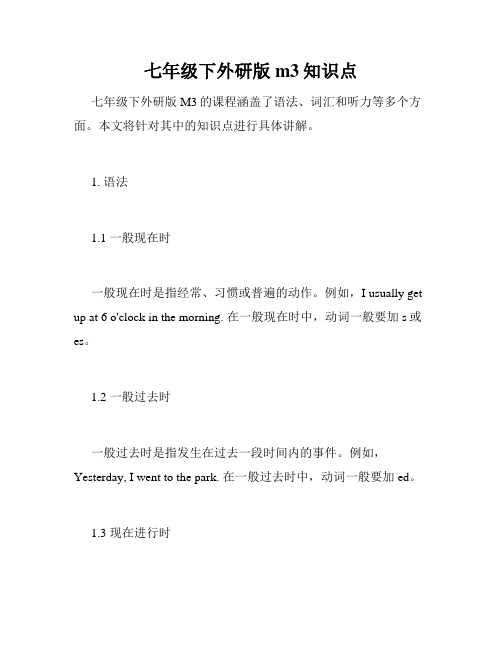
七年级下外研版m3知识点七年级下外研版M3的课程涵盖了语法、词汇和听力等多个方面。
本文将针对其中的知识点进行具体讲解。
1. 语法
1.1 一般现在时
一般现在时是指经常、习惯或普遍的动作。
例如,I usually get up at 6 o'clock in the morning. 在一般现在时中,动词一般要加s或es。
1.2 一般过去时
一般过去时是指发生在过去一段时间内的事件。
例如,Yesterday, I went to the park. 在一般过去时中,动词一般要加ed。
1.3 现在进行时
现在进行时是指当前正在进行的动作。
例如,I am studying English now. 在现在进行时中,动词要用be动词加上动词的ing形式。
2. 词汇
2.1 动物
本课程中学习了许多常见的动物,如狗、猫、鸟、鱼等。
需要掌握它们的名称和基本特征。
2.2 食物
本课程中学习了许多常见的食物,如面包、鸡蛋、米饭、蔬菜等。
需要掌握它们的名称、颜色以及基本特征。
3. 听力
3.1 短对话
学习了许多简单的短对话,需要通过听力训练加强对英语语音的理解,并掌握基本的交际用语。
3.2 长对话
学习了一些更长的对话,需要对听力理解能力进行更高程度的训练,并学习如何从对话中获取信息及回答问题。
总结:
七年级下外研版M3主要涵盖了语法、词汇和听力等多个方面的知识点。
通过学习,我们可以掌握基本的英语交流能力,并打下坚实的英语学习基础。
- 1、下载文档前请自行甄别文档内容的完整性,平台不提供额外的编辑、内容补充、找答案等附加服务。
- 2、"仅部分预览"的文档,不可在线预览部分如存在完整性等问题,可反馈申请退款(可完整预览的文档不适用该条件!)。
- 3、如文档侵犯您的权益,请联系客服反馈,我们会尽快为您处理(人工客服工作时间:9:00-18:30)。
七年级三种时态复习要点及巩固练习一般现在时(一) 定义:1)表示现在的状态;2)表示经常或惯的动作;3)表示主语县备的性格爱好或能力.例如:My backpack is on the sofa.He plays soccer ball every day. My sister gets up at 6:00. My mother likes strawberries. She knows English.(二) 标忠性时间状语:always, usually, often, sometimes, every week (day, year, month."),once a week, on Sundays, etc.(三) 一般现在时的构成:当谓语动词为be 动词时: 主语+be (am/is/are) +其它. 当谓语动词为行为动词时:主语+动词原形/V-s/V-es+其它(四) 一般现在时的基木结构:1. 当谓语动词为be 动词时:主语+ be (am/is/are) +其它. 肯定句:主语+ be (am/is/are) +其他否定句:主语 + be (am/is/are) +not+其他.(isn’t/aren’t) 一般疑问句:Be (Am / Is /Are) +主语+其他+?特殊疑问句:特殊錠问词+ be (am /is / are) +主语+其他+? 2. 当谓语动词为行为动词时:主语是第三人称单数时:主语+动词的第三人称单数+其他He likes the apples主语+doesn’ t+动词原形+其他 Does+主语+动词原形+其他+? Yes,主语+does. No,主语+doesn’ t. 特殊疑问词+—般疑问句+? 3. 当谓语动词为行为动词时:主语不是第三人称单数时: 主语+动词原形+其他 主语+don’ t+动词原形+其他 Do+主语+动词原形+其他+? Yes,主语+do. No,主语+don’ t. 待殊疑问词+—般疑问句+?(五) 动词的第三人称单数形式的变化规则(请用心记住新目标英语七年级教材 上册PP97-98表格内容)第三人称单数作主语时,谓语动词用单数,其变 化规则有: 1. 一般情况,在动词词尾加s;2. 以字母s, x ,ch ,sh ,o 结尾的动词,加es;3. 以e 结尾的动词,加s;肯定句: 否定句: 一般疑问句 肯定回答: 否定回答: 特殊疑问句 He doesn ,t like the apples. Does he like the apples? Yes, he does.No, he doesn ,t.What does he like?肯定句: 否定句: 一般疑问勾 肯定冋答: 否定回答: 特殊疑问句 i have a pen.I dor? t have a pen. Do you have a pen? Yes, T do. No ,I don’t. What do you have ?4.以辅音字母加y结尾的动词,先变y为i,再加es5.以元音字母加y结尾的动词,加s;6. 特殊:have+has are+is现在进行时(一)定义:表示现在(说话瞬间)正在进行或发生的动作,也可表示当前一 段时间内的活动或现阶段正在进行(二) 标忠性时间状语:now, listen! look! at this time, these days, etc. (三) 构成:主语+助动词be ( am/is / are /) +动词-ing (现在分词)形式+其它。
(翻译:…正在做…)例如:I’ m watching TV now.注意:be 要跟主语的人称和数变化,即,第一人称单数I,用am; 第三人称单数he, she, it, my sister, Tom …用is ,其它皆用are 。
肯定句: 主语+be (am / is / are /) +动词-ing+其它. 否定句: 主语+be (am /is/are ) +not+动词-ing+其它. 一般疑问句: Be (Am / Is / Are ) +主语+动词-ing+其它+? 肯定回答: Yes ,主语+be (am /is/are ). 否定回答: No,主语+be+not. (aren’t / isn’t )特殊疑问句: 特殊疑问词+相应be 动词+主语)+动词-ing+其它+?(四) 现在分词变化规则(请用心记住新目标英语七年级教材下册P100表格内容)。
1.直接+ing 2.去掉 e,+ ing 3.双写+ing4. 另外,有少数动词比较特殊,以后再学习。
一般过去时(一) 定义:1).表示过去某个时间发生的动作或存在的状态,常和表示过去的吋间状态连用2).—般过去吋态也表示过去经常或反复发生的 动作,常和often ,always 等表示频度的时间状语连用。
(二) 标志性时间状语:ago, yesterday, last week (year, night, month …),in 1989, oneday, long long ago, etc.(三)构成:当谓语动词为be 动词时:主语+ be (was/were ) +其它.当谓语动词为行为动词时:主语+动词-ed +其它.1. 当谓语动词为行为动词时:主语+动词-ed +其它.主语+动词-ed +其它. 主语+didn’ t+动词原形+其它. Did +主语+动词原形+其它+?. Yes ,主语+did. No,主语+didn’ t .特殊疑问词+ d i d +主语+动词原形+其它+? 2. 当谓语动词为be 动词吋主语+be (was/were) + 其它. 主语+be (was/were) +not+其它. Be (Was/Were) + 主语 + 其它+? Yes ,主语+be (was/were).No,主语+be+not. (wasn’ t/weren’ t ) • 特知疑问词+ be (was / were ) +主语+其它+?(四)规则与不规则动词过去式的构成。
(请用心记住新目标英语七年级教材下册P102表格内容)。
规则动词过去式:记住规律“直去双改” 1. 一般情况卜,在动词词尾加ed;肯定句:否定句: 一般疑问句 肯定冋答: 否定回答: 特殊疑问句 肯定句: 否定句: 一般疑问句 肯定回答: 否定回答: 特殊疑问句2.以e结尾的动词,加d;3.词尾只有一个辅音字母的重读闭音节,先双写该辅音字母,再加ed;4.以辅音字母加y结尾的动词,先变y为i,再加ed;5.以元音字母加y 结尾的动词,直接加ed;时态专项复习巩固练习1■举是一个学生.肯牢句: 5.听! Tom 正在教室里 否定句: 肯定句: 一般疑问句: 否定句: 肯舍[Ill 答: 一般疑问句: . 否定回答 肯定回答:否定回答 2.你每天做家庭作业.肯牢句: 6.我昨天在家里. 否定句: 肯定句: 一般疑问句: 否定句: 肯舍[Ill 答: 一般疑问句: . 否定回答 肯定回答:否定回答 3.她在北京工作.肯牢句: 7.Mary 昨天呆在家里 否定句: 肯备句: 一般疑问句: 否定句: 肯舍[Ill 答: 一般疑问句: . 否定回答 肯定回答:否定回答 4.我正在做家庭作业.(一般现在时、现在进行时、一般过去时) 一.翻译下列句子并变成否,一般疑问及肯定回答,否定回答 肯牟句: 否定句:一般疑问句: 肯定回答:否定回答 二.写出下列动词的形式。
A.写出下列动词的第三人称单数形式 watch have cookgofly drink staymake look have passcarry come watch studybrush do teach clean workwatch play takedanceget run swim sitshopstop make washAcloseknow ridebeguessB.写出下列动词的现在分词-ing 形式。
study , play , talk , watch , eat , listen , speak , read , relax , go take , come , write , make , dance , have ,run,swim, stop , shop, sit , begin , get, win, lie c.写出下列动词的过去式形式 owalk play stay livestopshopstudy putbeginruntake stopsitwait ________ turn ________ clean ______ get__________ enjoy _________cry ________ come ____________ do/ does ______________ am/is _________ are _______________ don’t/ doesn’t ________ have/has ___________ go __________三.用动词的正确形式填空1.1 _______ (do) my homework every evening.2.We ______ (fly) kites in the park on Sundays.3.Tom ____________ (play) the piano every Saturday. Now he _____________ (play).4.Look at the man! He ____________ (read) a magazine.5.Look! The plane _______________ (fly) over the building.6.Listen! My aunt ______________ (sing) in the room.She is a singer. She ____________ (like) singing. She _____________ (have) a music show. She is excited.7.What _______ you _______ (do) now? I ___________ (make) a paper plane.8.What _______ she ______ (do) yesterday? She _______ (visit) her grandparents.9. _____ your mother ______ (read) newspaper in the morning? Yes,She ________ .10.How ____ your father _________ (go) to work every day? He __________ (go) by bike, but he___________ (go) to work by taxi yesterday.四.选择题1 • ____ he ____ to the park at 6:30 in the morning? No,he ________ .A. Does; goes; doesB. Does; go; doesn’tC. Does; go; does2.Tim always _____ a picture at home. He _______ a car now.A. draws; is drawingB. draw; drawC. draws; draw3.She usually _____ her friends. They often ______ tea.A. see; drinkB. sees; drinksC. sees; drink4.Mr. Green usually _____ h is newspaper in the evening,but he and his wife ______ television yesterdayevening.A.reads; watchesB.reads; is going to watchC.reads; watched5. ____ you ______ fishing yesterday? No, we _____ .A. Does; go; doesn’tB. Did; go; didn’tC. Do; go; don’t6.Open the window,Please. Look! He _____ i t. A. opens B. is openning C. is opening7.1usually ____ some milk every day. But I _______ coffee yesterday.A. drink; drankB. is drinking; drinkC. drank; am drinking8.What _____ you usually _____ in the evening? I _______ computer games.What _____ you _____ last night? I ______ a book.A. do; do; play; did; do; readB. did; do; played; do; do; readC. does; do; plays; do; do; am reading9. ____ you ______ to music now? Yes,we _____ .A. Do; listen; doB. Did; listen; didC. Are; listening; are10.She ____ tea,but he ___ . A. likes; doesn’t B; like; don’t C. like; doesn’t11.—Did you go to the park on Sunday morning? _______ ,I went there in the afternoon.A. YesB. NoC. SureD. Sorry12.1don’t think he’s so great, but my mom_________ . A. do B. does C. is D. are13.. A kid _____ breakfast every morning, because it’s good for his health.A. have toB. has toC. has to haveD. has to has五.句型转换1.I often go to the movies with his friends.(对划线部分提问)2. He is reading a magazine now.(对划线部分提问))3. My father wants to be roporter.(把该句变为一般疑问句)4. Is Nacy diong her homework now?(把该句变为陈述句)5. Ben and Tim are waiting for a bus.(把该句变力否定句)6. He is swimming at the pool.(对划线部分提问))7. Dave and John are talking on the phone.(对划线部分提问))8. Jim likes dolphins, because they are very cute and clever.(对划线部分提问)) 9. Lucy did her homework at home.(改否定句)10. She read a book at home last night.(对划线部分提问) 11. My mother went to see some friends last Sunday.(改为同义句) 12. We had fun playing in the water.(同义句)强化练习一般现在时态练习1. This is my pencil ?(变一般疑问句)2. These red socks are Kate’ s •(变—般疑问句)3.1 want to buy a big green bag .(变特殊疑问句)4. Mary does not have any books •(变肯定句)Mary5. The clothing shop is on sale .(变为否定句)6. She likes the black bag very much .(变为否定句)7.1 buy the pants for only 50 Yuan.(用 she 改写句子) the pants for only 50 Yuan.8. It’ s an English dictionary .(对画线部分提问)9. Lily and Lucy are fifteen years old now .(对画线部分提问)Lily and Lucy ?10. Her dog is 2 years and 5 months old .(变为否定句)Her dog 2 years and 5 months old . 二. 用be 动词的适当形式填空。
